List of mammals of Kazakhstan
This is a list of the mammal species recorded in Kazakhstan. Kazakhstan has 124 mammal species, of which one is critically endangered, five are endangered, 12 are vulnerable, and four are near threatened. One of the species listed for Kazakhstan can no longer be found in the wild.[1]
The following tags are used to highlight each species' conservation status as assessed by the International Union for Conservation of Nature:
| EX | Extinct | No reasonable doubt that the last individual has died. |
| EW | Extinct in the wild | Known only to survive in captivity or as a naturalized populations well outside its previous range. |
| CR | Critically endangered | The species is in imminent risk of extinction in the wild. |
| EN | Endangered | The species is facing an extremely high risk of extinction in the wild. |
| VU | Vulnerable | The species is facing a high risk of extinction in the wild. |
| NT | Near threatened | The species does not meet any of the criteria that would categorise it as risking extinction but it is likely to do so in the future. |
| LC | Least concern | There are no current identifiable risks to the species. |
| DD | Data deficient | There is inadequate information to make an assessment of the risks to this species. |
Order: Artiodactyla (even-toed ungulates)

The even-toed ungulates are
- Family: Cervidae(deer)
- Subfamily: Cervinae
- Genus: Cervus
- Wapiti, C. canadensis LC[2]
- Central Asian red deer C. hanglu LC[3]
- Bactrian deer, C. h. bactrianus[3]
- Genus: Cervus
- Subfamily: Capreolinae
- Genus: Alces
- Genus: Capreolus
- Siberian roe deer, C. pygargus LC
- Genus:
- Subfamily: Cervinae
- Family: Moschidae (musk deer)
- Genus: Moschus
- Siberian musk deer, M. moschiferus VU
- Genus: Moschus
- Family: Bovidae (cattle, antelope, sheep, goats)
- Subfamily: Antilopinae
- Genus: Gazella
- Goitered gazelle, G. subgutturosa VU[5]
- Genus: Saiga
- Saiga antelope, S. tatarica CR[6]
- Genus:
- Subfamily: Caprinae
- Subfamily: Antilopinae
- Family: Suidae (pigs)
Order: Carnivora (carnivorans)
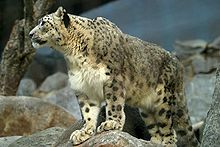
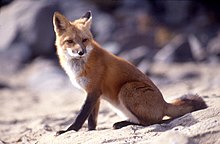

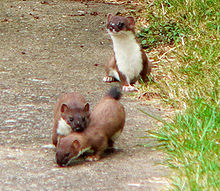

There are over 260 species of carnivorans, the majority of which feed primarily on meat. They have a characteristic skull shape and dentition.
- Family: Felidae (cats)
- Subfamily: Felinae
- Genus: Caracal
- Genus: Felis
- Jungle cat, F. chaus LC[11]
- African wildcat, F. lybica LC[12]
- Asiatic wildcat, F. l. ornata
- Sand cat, F. margarita LC[13]
- Genus: Lynx
- Eurasian lynx, L. lynx LC[14]
- Genus: Otocolobus
- Pallas's cat, O. manul LC[15]
- Subfamily: Pantherinae
- Genus: Panthera
- Leopard, P. pardus VU vagrant
- P. p. tulliana EN vagrant[16][17]
- Snow leopard, P. uncia VU[18]
- Leopard, P. pardus VU vagrant
- Genus: Panthera
- Subfamily: Felinae
- Family: Canidae (dogs, foxes)
- Genus: Canis
- Golden jackal, C. aureus LC[19]
- Gray wolf, C. lupus LC[20]
- Genus: Vulpes
- Corsac fox, V. corsac LC[21]
- Red fox, V. vulpes LC[22]
- Genus: Canis
- Family: Ursidae(bears)
- Genus: Ursus
- Brown bear, U. arctos LC[23]
- Genus:
- Family: Mustelidae (mustelids)
- Genus: Lutra
- European otter, L. lutra NT[24]
- Genus: Martes
- Beech marten, M. foina LC[25]
- European pine marten, M. martes LC[26]
- Sable, M. zibellina LC
- Genus: Meles
- Asian badger, M. leucurus LC[27]
- Genus: Mellivora
- Honey badger, M. capensis LC[28]
- Genus: Mustela
- Mountain weasel, M. altaica NT[29]
- Stoat, M. erminea LC[30]
- Steppe polecat, M. eversmannii LC[31]
- Least weasel, M. nivalis LC[32]
- Genus: Vormela
- Marbled polecat, V. peregusna VU[33]
- Genus: Lutra
- Family: Phocidae(earless seals)
- Genus: Pusa
- Caspian seal, P. caspica VU
- Genus: Pusa
Order: Chiroptera (bats)

The bats' most distinguishing feature is that their forelimbs are developed as wings, making them the only mammals capable of flight. Bat species account for about 20% of all mammals.
- Family: Vespertilionidae
- Subfamily: Myotinae
- Genus: Myotis
- Lesser mouse-eared bat, M. blythii LC[34]
- Brandt's bat, M. brandti LC[35]
- Pond bat, M. dasycneme NT[36]
- Geoffroy's bat, M. emarginatus LC[37]
- Genus:
- Subfamily: Vespertilioninae
- Genus: Eptesicus
- Bobrinski's serotine, Eptesicus bobrinskoi LC
- Botta's serotine, Eptesicus bottae LC
- Genus: Hypsugo
- Savi's pipistrelle, H. savii LC[38]
- Genus: Nyctalus
- Greater noctule bat, N. lasiopterus NT[39]
- Lesser noctule, N. leisleri LC[40]
- Common noctule, N. noctula LC[41]
- Genus: Pipistrellus
- Kuhl's pipistrelle, Pipistrellus kuhlii LC
- Common pipistrelle, Pipistrellus pipistrellus LC
- Genus: Plecotus
- Grey long-eared bat, Plecotus austriacus LC
- Genus: Eptesicus
- Subfamily: Myotinae
- Family: Rhinolophidae
- Subfamily: Rhinolophinae
- Genus: Rhinolophus
- Greater horseshoe bat, R. ferrumequinum LC[42]
- Lesser horseshoe bat, R. hipposideros LC[43]
- Genus:
- Subfamily:
Order: Erinaceomorpha (hedgehogs and gymnures)

The order Erinaceomorpha contains a single family, Erinaceidae, which comprise the hedgehogs and gymnures. The hedgehogs are easily recognised by their spines while gymnures look more like large rats.
- Family: Erinaceidae (hedgehogs)
- Subfamily: Erinaceinae
- Genus: Paraechinus
- Brandt's hedgehog, P. hypomelas LC
- Genus: Paraechinus
- Subfamily:
Order: Lagomorpha (lagomorphs)
The lagomorphs comprise two families, Leporidae (hares and rabbits) and Ochotonidae (pikas). Though they can resemble rodents, and were classified as a superfamily in that order until the early 20th century, they have since been considered a separate order. They differ from rodents in a number of physical characteristics, such as having four incisors in the upper jaw rather than two.
- Family: Leporidae (hares and rabbits)
- Genus: Lepus
- European hare, L. europaeus LC[44]
- Mountain hare, L. timidus LC[45]
- Tolai hare, L. tolai LC[46]
- Genus:
- Family: Ochotonidae(pikas)
- Genus: Ochotona
- Alpine pika, O. alpina LC
- Large-eared pika, O. macrotis LC
- Steppe pika, O. pusilla LC
- Turkestan red pika, O. rutila LC
- Genus:
Order: Perissodactyla (odd-toed ungulates)

The odd-toed ungulates are browsing and grazing mammals. They are usually large to very large, and have relatively simple stomachs and a large middle toe.
- Family: Equidae (horses etc.)
- Genus: Equus
- Wild horse E. ferus EN reintroduced
- Tarpan, E. f. ferus EX
- Przewalski's horse, E. f. przewalskii EN reintroduced[47]
- Onager, E. hemionus NT
- Mongolian wild ass, E. h. hemionus
- Turkmenian kulan, E. h. kulan
- Wild horse E. ferus EN reintroduced
- Genus: Equus
Order: Rodentia (rodents)
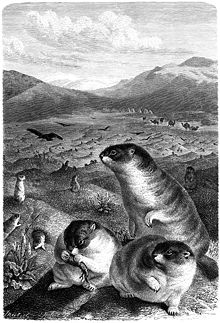

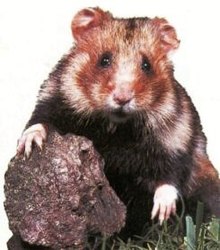

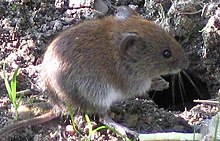

Rodents make up the largest order of mammals, with over 40% of mammalian species. They have two incisors in the upper and lower jaw which grow continually and must be kept short by gnawing. Most rodents are small though the capybara can weigh up to 45 kg (99 lb).
- Family: Hystricidae(Old World porcupines)
- Genus: Hystrix
- Indian crested porcupine, H. indica LC[48]
- Genus:
- Family: Castoridae (beavers)
- Genus: Castor
- Eurasian beaver, C. fiber LC[49]
- Genus: Castor
- Family: Sciuridae(squirrels)
- Subfamily: Xerinae
- Tribe: Xerini
- Genus: Spermophilopsis
- Long-clawed ground squirrel, Spermophilopsis leptodactylus LC
- Tribe: Marmotini
- Genus: Eutamias
- Siberian chipmunk, Eutamias sibiricus LC
- Genus: Marmota
- Gray marmot, Marmota baibacina Lc
- Bobak marmot, Marmota bobak LC
- Menzbier's marmot, Marmota menzbieri VU
- Genus: Spermophilus
- Red-cheeked ground squirrel, Spermophilus erythrogenys LC
- Yellow ground squirrel, Spermophilus fulvus LC
- Russet ground squirrel, Spermophilus major LC
- Little ground squirrel, Spermophilus pygmaeus LC
- Tien Shan ground squirrel, Spermophilus relictus LC
- Long-tailed ground squirrel, Spermophilus undulatus LC
- Genus: Eutamias
- Genus:
- Tribe: Xerini
- Subfamily: Xerinae
- Family: Gliridae(dormice)
- Subfamily: Leithiinae
- Genus: Dryomys
- Forest dormouse, Dryomys nitedula LC
- Genus: Selevinia
- Desert dormouse, Selevinia betpakdalaensis EN
- Genus: Dryomys
- Subfamily: Leithiinae
- Family: Dipodidae(jerboas)
- Subfamily: Allactaginae
- Genus: Allactaga
- Small five-toed jerboa, Allactaga elater LC
- Great jerboa, Allactaga major LC
- Severtzov's jerboa, Allactaga severtzovi LC
- Mongolian five-toed jerboa, Allactaga sibirica LC
- Vinogradov's jerboa, Allactaga vinogradovi LC
- Genus: Pygeretmus
- Lesser fat-tailed jerboa, Pygeretmus platyurus LC
- Dwarf fat-tailed jerboa, Pygeretmus pumilio LC
- Greater fat-tailed jerboa, Pygeretmus shitkovi LC
- Genus: Allactaga
- Subfamily: Cardiocraniinae
- Genus: Cardiocranius
- Five-toed pygmy jerboa, Cardiocranius paradoxus VU
- Genus: Salpingotus
- Thick-tailed pygmy jerboa, Salpingotus crassicauda VU
- Heptner's pygmy jerboa, Salpingotus heptneri LC
- Pallid pygmy jerboa, Salpingotus pallidus LC
- Genus:
- Subfamily: Dipodinae
- Genus: Dipus
- Northern three-toed jerboa, Dipus sagitta LC
- Genus: Eremodipus
- Lichtenstein's jerboa, Eremodipus lichtensteini LC
- Genus: Paradipus
- Comb-toed jerboa, Paradipus ctenodactylus LC
- Genus: Stylodipus
- Thick-tailed three-toed jerboa, Stylodipus telum LC
- Genus: Dipus
- Subfamily: Sicistinae
- Genus: Sicista
- Northern birch mouse, Sicista betulina LC
- Altai birch mouse, Sicista napaea LC
- Gray birch mouse, Sicista pseudonapaea DD
- Southern birch mouse, Sicista subtilis LC
- Tien Shan birch mouse, Sicista tianschanica LC
- Genus:
- Subfamily: Allactaginae
- Family: Spalacidae
- Subfamily: Myospalacinae
- Genus: Myospalax
- Siberian zokor, Myospalax myospalax LC
- Genus: Myospalax
- Subfamily: Spalacinae
- Genus: Spalax
- Giant mole-rat, Spalax giganteus VU
- Genus: Spalax
- Subfamily:
- Family: Cricetidae
- Subfamily: Cricetinae
- Genus: Allocricetulus
- Eversmann's hamster, Allocricetulus eversmanni LC
- Genus: Cricetulus
- Long-tailed dwarf hamster, Cricetulus longicaudatus LC
- Grey dwarf hamster, Cricetulus migratorius LC
- Genus: Cricetus
- European hamster, C. cricetus CR[50]
- Genus: Phodopus
- Roborovski hamster, Phodopus roborovskii LC
- Winter white Russian dwarf hamster, Phodopus sungorus LC
- Long-tailed dwarf hamster, Cricetulus longicaudatus LC
- Genus: Allocricetulus
- Subfamily: Arvicolinae
- Genus: Alticola
- Flat-headed vole, Alticola strelzowi LC
- Genus: Clethrionomys
- Bank vole, Clethrionomys glareolus LC
- Northern red-backed vole, Clethrionomys rutilus LC
- Genus: Ellobius
- Northern mole vole, Ellobius talpinus LC
- Zaisan mole vole, Ellobius tancrei LC
- Genus: Eolagurus
- Yellow steppe lemming, Eolagurus luteus LC
- Genus: Lagurus
- Steppe lemming, Lagurus lagurus LC
- Genus: Microtus
- Field vole, Microtus agrestis LC
- Tien Shan vole, Microtus kirgisorum LC
- Tundra vole, Microtus oeconomus LC
- Social vole, Microtus socialis LC
- Genus: Alticola
- Subfamily:
- Family: Muridae (mice, rats, voles, gerbils, hamsters)
- Subfamily: Gerbillinae
- Genus: Meriones
- Libyan jird, Meriones libycus LC
- Midday jird, Meriones meridianus LC
- Tamarisk jird, Meriones tamariscinus LC
- Genus: Rhombomys
- Great gerbil, Rhombomys opimus LC
- Subfamily: Murinae
- Genus: Apodemus
- Ural field mouse, Apodemus uralensis LC
- Genus: Rattus
- Genus: Apodemus
- Genus: Meriones
Order: Soricomorpha (shrews, moles and solenodons)
The "shrew-forms" are insectivorous mammals. The shrews and solenodons closely resemble mice, while the moles are stout-bodied burrowers.
- Family: Soricidae(shrews)
- Subfamily: Crocidurinae
- Genus: Crocidura
- Lesser rock shrew, Crocidura serezkyensis LC
- Lesser white-toothed shrew, C. suaveolens LC[52]
- Genus: Diplomesodon
- Piebald shrew, Diplomesodon pulchellum LC
- Genus: Suncus
- Etruscan shrew, Suncus etruscus LC
- Genus: Crocidura
- Subfamily: Soricinae
- Tribe: Nectogalini
- Genus: Neomys
- Eurasian water shrew, Neomys fodiens LC
- Genus: Neomys
- Tribe: Soricini
- Genus: Sorex
- Tien Shan shrew, Sorex asper LC
- Laxmann's shrew, Sorex caecutiens LC
- Eurasian pygmy shrew, Sorex minutus LC
- Genus: Sorex
- Tribe: Nectogalini
- Subfamily:
- Family: Talpidae (moles)
- Subfamily: Talpinae
- Tribe: Desmanini
- Genus: Desmana
- Russian desman, Desmana moschata VU
- Genus: Desmana
- Tribe:
- Subfamily: Talpinae
Locally extinct
The following species are
- Cheetah, Acinonyx jubatus[53]
- Wild Bactrian camel, Camelus ferus[54]
- Dhole, Cuon alpinus[55]
- European mink, Mustela lutreola[56]
- Tiger, Panthera tigris[57]
- Mongolian gazelle, Procapra gutturosa[58]
References
- where no Wikipedia article was available.
- ^ Brook, S.M.; Pluháček, J.; Lorenzini, R.; Lovari, S.; Masseti, M.; Pereladova, O.; Mattioli, S. (2019) [errata version of 2018 assessment]. "Cervus canadensis". IUCN Red List of Threatened Species. 2018: e.T55997823A142396828. Retrieved 9 September 2020.
- ^ a b Brook, S.M.; Donnithorne-Tait, D.; Lorenzini, R.; Lovari, S.; Masseti, M.; Pereladova, O.; Ahmad, K. & Thakur, M. (2017). "Cervus hanglu". IUCN Red List of Threatened Species. 2017: e.T4261A120733024.
- ^ Hundertmark, K. (2016). "Alces alces". IUCN Red List of Threatened Species. 2016: e.T56003281A22157381.
- ^ IUCN SSC Antelope Specialist Group (2017). "Gazella subgutturosa". IUCN Red List of Threatened Species. 2017: e.T8976A50187422.
- ^ IUCN SSC Antelope Specialist Group (2018). "Saiga tatarica". IUCN Red List of Threatened Species. 2018: e.T19832A50194357.
- ^ Reading, R.; Michel, S. & Amgalanbaatar, S. (2020). "Ovis ammon". IUCN Red List of Threatened Species. 2020: e.T15733A22146397.
- ^ Michel, S. & Ghoddousi, A. (2020). "Ovis vignei". IUCN Red List of Threatened Species. 2020: e.T54940655A54940728.
{{cite journal}}: CS1 maint: multiple names: authors list (link) - ^ Keuling, O. & Leus, K. (2019). "Sus scrofa". IUCN Red List of Threatened Species. 2019: e.T41775A44141833.
- ^ Avgan, B.; Henschel, P. & Ghoddousi, A. (2016). "Caracal caracal". IUCN Red List of Threatened Species. 2016: e.T3847A102424310.
- ^ Gray, T.N.E.; Timmins, R.J.; Jathana, D.; Duckworth, J.W.; Baral, H. & Mukherjee, S. (2016). "Felis chaus". IUCN Red List of Threatened Species. 2016: e.T8540A50651463.
- .
- ^ Sliwa, A.; Ghadirian, T.; Appel, A.; Banfield, L.; Sher Shah, M. & Wacher, T. (2016). "Felis margarita". IUCN Red List of Threatened Species. 2016: e.T8541A50651884.
- ^ Breitenmoser, U.; Breitenmoser-Würsten, C.; Lanz, T.; von Arx, M.; Antonevich, A.; Bao, W. & Avgan, B. (2015). "Lynx lynx". IUCN Red List of Threatened Species. 2015: e.T12519A121707666.
- ^ Ross, S.; Barashkova, A.; Dhendup, T.; Munkhtsog, B.; Smelansky, I.; Barclay, D. & Moqanaki, E. (2020). "Otocolobus manul". IUCN Red List of Threatened Species. 2020: e.T15640A180145377.
- ^ Shakula, V. (2004). "First record of leopard (Panthera pardus) in Kazakhstan". Cat News (41): 11–12.
- ^ Pestov, M. V.; Nurmukhambetov, Z. E.; Mukhashov, A. T.; Terentyev, V. A. & Rosen, T. (2019). "First camera trap record of Persian leopard in Ustyurt State Nature Reserve, Kazakhstan". Cat News (69): 14–16.
- ^ McCarthy, T.; Mallon, D.; Jackson, R.; Zahler, P. & McCarthy, K. (2017). "Panthera uncia". IUCN Red List of Threatened Species. 2017: e.T22732A50664030.
- ^ Hoffmann, M.; Arnold, J.; Duckworth, J. W.; Jhala, Y.; Kamler, J. F. & Krofel, M. (2018). "Canis aureus". IUCN Red List of Threatened Species. 2018: e.T118264161A46194820.
- ^ Boitani, L.; Phillips, M. & Jhala, Y. (2018). "Canis lupus". IUCN Red List of Threatened Species. 2018: e.T3746A119623865.
- ^ Murdoch, J.D. (2014). "Vulpes corsac". IUCN Red List of Threatened Species. 2014: e.T23051A59049446.
- ^ Hoffmann, M. & Sillero-Zubiri, C. (2016). "Vulpes vulpes". IUCN Red List of Threatened Species. 2016: e.T23062A46190249.
- ^ McLellan, B. N.; Proctor, M. F.; Huber, D. & Michel, S. (2017). "Ursus arctos". IUCN Red List of Threatened Species. 2017: e.T41688A121229971.
- ^ Roos, A.; Loy, A.; de Silva, P.; Hajkova, P. & Zemanová, B. (2015). "Lutra lutra". IUCN Red List of Threatened Species. 2015: e.T12419A21935287.
- ^ Abramov, A.V.; Kranz, A.; Herrero, J.; Krantz, A.; Choudhury, A. & Maran, T. (2016). "Martes foina". IUCN Red List of Threatened Species. 2016: e.T29672A45202514.
- ^ Herrero, J.; Kranz, A.; Skumatov, D.; Abramov, A.V.; Maran, T. & Monakhov, V.G. (2016). "Martes martes". IUCN Red List of Threatened Species. 2016: e.T12848A45199169.
- ^ Abramov, A. (2016). "Meles leucurus". IUCN Red List of Threatened Species. 2016: e.T136385A45221149.
- ^ Do Linh San, E.; Begg, C.; Begg, K. & Abramov, A. V. (2016). "Mellivora capensis". IUCN Red List of Threatened Species. 2016: e.T41629A45210107.
- ^ Abramov, A. (2016). "Mustela altaica". IUCN Red List of Threatened Species. 2016: e.T41653A45213647.
- ^ Reid, F.; Helgen, K. & Kranz, A. (2016). "Mustela erminea". IUCN Red List of Threatened Species. 2016: e.T29674A45203335.
- ^ Maran, T.; Skumatov, D.; Abramov A. V. & Kranz, A. (2016). "Mustela eversmanii". IUCN Red List of Threatened Species. 2016: e.T29679A45203762.
- ^ McDonald, R. A.; Abramov, A. V.; Stubbe, M.; Herrero, J.; Maran, T.; Tikhonov, A.; Cavallini, P.; Kranz, A.; Giannatos, G.; Kryštufek, B. & Reid, F. (2019). "Mustela nivalis". IUCN Red List of Threatened Species. 2019: e.T70207409A147993366.
- ^ Abramov, A.V.; Kranz, A. & Maran, T. (2016). "Vormela peregusna". IUCN Red List of Threatened Species. 2016: e.T29680A45203971.
- ^ Juste, J. & Paunović, M. (2016). "Myotis blythii". IUCN Red List of Threatened Species. 2016: e.T14124A22053297.
- ^ Gazaryan, S.; Kruskop, S.V. & Godlevska, L. (2020). "Myotis brandtii". IUCN Red List of Threatened Species. 2020: e.T85566997A22054468.
- ^ Piraccini, R. (2016). "Myotis dasycneme". IUCN Red List of Threatened Species. 2016: e.T14127A22055164.
- ^ Piraccini, R. (2016). "Myotis emarginatus". IUCN Red List of Threatened Species. 2016: e.T14129A22051191.
- ^ Hutson, A. M.; Spitzenberger, F.; Juste, J.; Aulagnier, S.; Palmeirim, J.; Paunovic, M. & Karatas, A. (2010). "Hypsugo savii". IUCN Red List of Threatened Species. 2010: e.T44856A10955205.
- ^ Hutson, A. M.; Alcaldé, J. T.; Juste, J.; Karataş, A.; Palmeirim, J. & Paunović, M. (2010). "Nyctalus lasiopterus". IUCN Red List of Threatened Species. 2010: e.T14918A4471682.
- ^ Juste, J. & Paunović, M. (2016). "Nyctalus leisleri". IUCN Red List of Threatened Species. 2016: e.T14919A22016159.
- ^ Csorba, G. & Hutson, A.M. (2016). "Nyctalus noctula". IUCN Red List of Threatened Species. 2016: e.T14920A22015682.
- ^ Piraccini, R. (2016). "Rhinolophus ferrumequinum". IUCN Red List of Threatened Species. 2016: e.T19517A21973253.
- ^ Taylor, P. (2016). "Rhinolophus hipposideros". IUCN Red List of Threatened Species. 2016: e.T19518A21972794.
- ^ Hacklande, K. & Schai-Braun, S. (2019). "Lepus europaeus". IUCN Red List of Threatened Species. 2019: e.T41280A45187424.
- ^ Smith, A.T. & Johnston, C.H. (2019). "Lepus timidus". IUCN Red List of Threatened Species. 2019: e.T11791A45177198.
- ^ Smith, A.T. & Johnston, C.H. (2019). "Lepus tolai". IUCN Red List of Threatened Species. 2019: e.T41308A45193447.
- ^ "Fresh research shows how horse domestication helped shape humanity". Horsetalk. May 10, 2018. Retrieved 21 March 2021.
- ^ Amori, G.; Hutterer, R.; Kryštufek, B.; Yigit, N.; Mitsain, G. & Palomo, L. J. (2016). "Hystrix indica". IUCN Red List of Threatened Species. 2016: e.T10751A115099509.
- ^ Batbold, J.; Batsaikhan, N.; Shar, S.; Hutterer, R.; Kryštufek, B.; Yigit, N.; Mitsain, G. & Palomo, L. (2016). "Castor fiber". IUCN Red List of Threatened Species. 2016: e.T4007A115067136.
- ^ Banaszek, A.; Bogomolov, P.; Feoktistova, N.; La Haye, M.; Monecke, S.; Reiners, T. E.; Rusin, M.; Surov, A.; Weinhold, U. & Ziomek, J. (2020). "Cricetus cricetus". IUCN Red List of Threatened Species. 2020: e.T5529A111875852.
- ^ Ruedas, L. (2016). "Rattus norvegicus". IUCN Red List of Threatened Species. 2016: e.T19353A165118026.
- ^ Hutterer, R.; Amori, G.; Krystufek, B.; Yigit, N.; Mitsain, G. & Palomo, L.J. (2010). "Crocidura suaveolens". IUCN Red List of Threatened Species. 2010: e.T29656A9511068.
- ^ Durant, S.; Mitchell, N.; Ipavec, A. & Groom, R. (2015). "Acinonyx jubatus". IUCN Red List of Threatened Species. 2015: e.T219A50649567.
- ^ Hare, J. (2008). "Camelus ferusa". IUCN Red List of Threatened Species. 2008: e.T63543A126892852.
- ^ Kamler, J. F.; Songsasen, N.; Jenks, K.; Srivathsa, A.; Sheng, L. & Kunkel, K. (2015). "Cuon alpinus". IUCN Red List of Threatened Species. 2015: e.T5953A72477893.
- ^ Maran, T.; Aulagnier, S.; Libois, R.; Kranz, A.; Abramov, A. & Wozencraft, C. (2010). "Mustela lutreola". IUCN Red List of Threatened Species. 2010: e.T14018A4381596.
- ^ Goodrich, J.; Lynam, A.; Miquelle, D.; Wibisono, H.; Kawanishi, K.; Pattanavibool, A.; Htun, S.; Tempa, T.; Karki, J.; Jhala, Y. & Karanth, U. (2015). "Panthera tigris". IUCN Red List of Threatened Species. 2015: e.T15955A50659951.
- ^ IUCN SSC Antelope Specialist Group (2016). "Procapra gutturosa". IUCN Red List of Threatened Species. 2016: e.T18232A115142812.
External links
- "Animal Diversity Web". University of Michigan Museum of Zoology. 1995–2006. Retrieved 22 May 2007.
